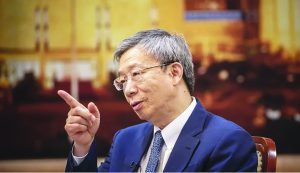BLOOMBERG
China reappointed several top economic officials in a leadership reshuffle Sunday, giving investors greater continuity as Beijing overhauls financial regulation and grapples with escalating tensions with the US.
People’s Bank of China (PBOC) Governor Yi Gang, 65, will remain in his post, as will the finance and commerce ministers. He Lifeng, a close ally of President Xi Jinping, was appointed a vice premier, signaling he could replace Liu He as the nation’s top economic official.
The retention of Yi and others — announced at the National People’s Congress, the annual parliamentary gathering — surprised analysts who were expecting a larger reshuffle. Many predicted officials with international experience, like the PBOC governor, would be replaced by men with closer personal ties to Xi but less familiar to global investors.
Keeping some of the existing economic team in place provides continuity as Beijing creates a powerful new financial regulatory body and confronts a more hostile geopolitical environment.
“The fact that the main technocrats are staying should reassure the market and reduce chances of mistakes during policy implementation,†said Qian Wang, Vanguard Group Inc.’s chief Asia-Pacific economist.
PBOC Governor Yi and Finance Minister Liu Kun were widely expected to step down after reaching the official retirement age for government officials of their rank, and after they exited the Communist Party’s leadership ranks last year.
However, Yi was appointed to a position on a top government advisory body, allowing him to circumvent usual retirement limits — a similar arrangement to his predecessor Zhou Xiaochuan.
The decision to retain Yi “is primarily driven by financial stability concerns,†such as a still uncertain economic recovery following the end of pandemic restrictions, a property market slump and high local government debt, said Houze Song, a fellow at US think tank MacroPolo.
“Yi, who is experienced in dealing with financial risks and well known internationally, can help Beijing to muddle through,†he said. Liu, the finance minister, will likely focus on managing the financial strains on local governments, Song added.
The governor’s tenure at the central bank has been marked by a campaign to slow credit growth in order to stabilise debt ratios, increased flexibility of the yuan, and the use of monetary policy to channel funding to favored sectors of the economy, such as renewable energy and small businesses.
Yi has strong academic credentials, previously teaching economics at Indiana University in the US, as well as extensive international work experience. He is a regular participant in global summits, and held lengthy discussions with US Treasury Secretary Janet Yellen at a Group of 20 summit in November.
Yi will be “a familiar technocratic face to keep things humming,†while Beijing revamps financial regulation, said Christopher Beddor, deputy China research director at Gavekal Dragonomics. “The leadership was clearly debating among several candidates in the run-up to this decision, and opted to go for continuity.â€
Since Yi doesn’t hold a senior position in the Communist Party, it’s possible his reappointment could be an “interim arrangement,†lasting several months or one year, said Hui Feng, co-author of “The Rise of the People’s Bank of China†and a senior lecturer at Griffith University in Australia.
“Stability is priority, especially considering the dire challenges the bank faces in the short term, namely the ballooning of public debt and great uncertainties in global economic and geopolitical arena,†he added.
 The Gulf Time Newspaper One of the finest business newspapers in the UAE brought to you by our professional writers and editors.
The Gulf Time Newspaper One of the finest business newspapers in the UAE brought to you by our professional writers and editors.
